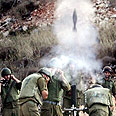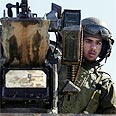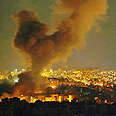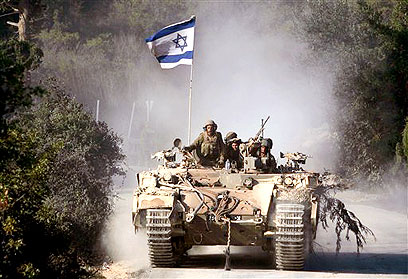


Ceasefire begins; firing incidents in Lebanon
Calm violated in western region incident; no injuries among IDF soldiers. At 8 a.m. Monday, forces ordered to silence guns. Just before ceasefire comes into force, IDF continues to launch offensive and defensive actions, with artillery batteries firing shells at areas in southern Lebanon. Army officials admit ceasefire is fragile in light of vulnerable situation, but clarify they will 'give it a chance'
First incidents - several hours after ceasefire comes into force: Israel Defense Forces officials reported that a Hizbullah terrorist tried to open fire at soldiers in the village of Hadata in the western region at 11:30 a.m. Monday.
The soldiers fired back and hit him. There were no injuries among the soldiers.
IDF officials stressed that "the force opened fire in self defense. The IDF honors the UN resolution agreement, but will continue to defend the forces deployed in the area and the citizens of the State of Israel."
About an hour and a half later, another incident took place between soldiers and Hizbullah gunmen in the village of Randouria in the eastern village. IDF soldiers opened fire at a number of terrorists. One of the terrorists were killed, and there were no injuries among the soldiers.
Earlier, after 33 days of fighting, more than 150 people killed on the Israeli side and about 1,000 on the Lebanese side, the ceasefire in Lebanon came into force at 8 a.m. Monday, and forces were ordered to silence their guns.
Shortly before the ceasefire came into force, the IDF continued to launch offensive and defensive actions, with artillery batteries firing shells at areas in southern Lebanon. The artillery fire continued almost nonstop.
According to reports, the Israel Air Force also struck in Lebanon, apparently in its last sorties before the ceasefire came into force.

Soldiers leave Lebanon (Photo: AP)
Some 161 people injured in the fighting and the rocket fire are still hospitalized at the Rambam Medical Center in Haifa, the Nahariya hospital, the Ziv Medical Center in Haifa and Bnei Zion Medical Center in Haifa, 114 of them soldiers. Thirty-four of the injured are in serious condition, 47 in moderate condition and the rest in light condition.
The forces in the field deployed in the centers set in advance. There are two main centers which will allow the IDF to operate effectively in case the ceasefire fails.
The IDF received a clear force to completely honor the ceasefire and not create any incident which may heat up the region. The forces were instructed to open fire only if their lives are in danger. In such a case, the forces would be allowed to fire with all means.
Army officials admitted that the ceasefire was fragile in light of the vulnerable situation, but clarified that "they would give a chance" and silence their guns as of 8 a.m.
The naval and aerial blockade will remain, at least on Monday morning. IDF officials said that they would be lifted only after Lebanon presents its own supervision mechanism for the crossings. However, it appears that if the ceasefire lasts, the blockades will be lifted sooner.
Lebanon's finance minister said Monday morning that "the ceasefire remains unchanged," and noted that "so far there has been no fire in southern Lebanon."
Efforts to locate bodies of helicopter crewmembers
Another fundamental issue which the IDF is facing is that the five crewmembers of the Yasur helicopter which crashed Saturday are still presumed missing, and the army is exerting efforts to locate their bodies before the forces have to leave Lebanon.
Apart from that, more than 20 IDF vehicles, including tanks and armored vehicles, which were hit during the fighting, were left on Lebanese territory.
In the past few hours, several vehicles were rescued, but IDF officials admitted that time is running out and they are now looking for solutions to get the other vehicles into Israeli territory, a complex and dangerous mission.
Sources in the IDF noted that the efforts to remove all the vehicles will continue, but simultaneously they are also looking into the possibility to bomb at least some of them from to air so as not to allow Hizbullah terrorists to wave their flags over them after the war.
IDF officials estimated that the ceasefire will bring about relative calm in the northern border and that the firing of Katyushas and rockets will stop. However, there will be clashes and fire incidents between Hizbullah activists and IDF soldiers in southern Lebanon. Therefore, they recommended to the political echelon not to leave IDF soldiers inside Lebanon beyond the time needed.
According to a senior officer, "we recommended to the political echelon to stay in the area as much as needed, and not beyond that. We have no interest in a long stay because we are aware of the risk and damage potential involved in it."
At least two incident involving IDF soldiers and Hizbullah members took place Sunday night in the eastern region. Four terrorists were killed. The Israel Air Force struck 178 terror targets, including 11 rocket launchers and 122 buildings, as well as headquarters, activists' homes, tunnels and petrol stations.
"If it turns out that the elements involved in the agreement violate it, IDF soldiers will have no restriction to operate in order to defend their lives," Defense Minister Amir Peretz clarified on Sunday. "There will be no situation in which IDF soldiers will be hurt and we will not retaliate. We will retaliate with all means."
During his visit to the Northern Command, Peretz added: "The commanders and soldiers on the battlefield must know that they contributed to the formulation of the diplomatic document (UN Resolution) that is aimed at guaranteeing peace in the north for years to come. There was never an agreement more favorable to Israel."
At the last minute, several hours before the ceasefire, Nasrallah planned to launch more surprises at the front and the Israeli home front, with UAVs carrying explosives and a terror attack on the border.
Meital Yasur-Beit Or contributed to the report















